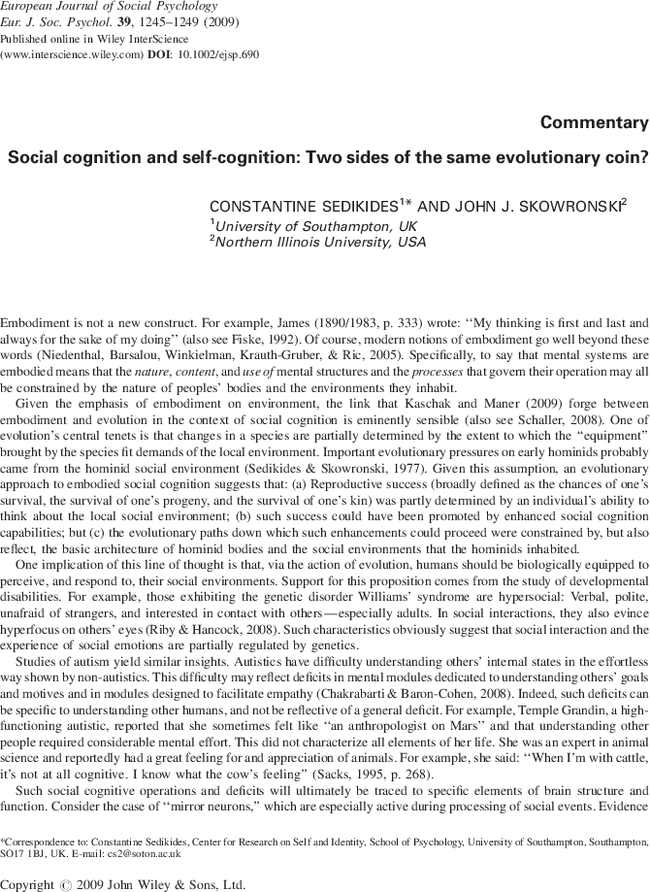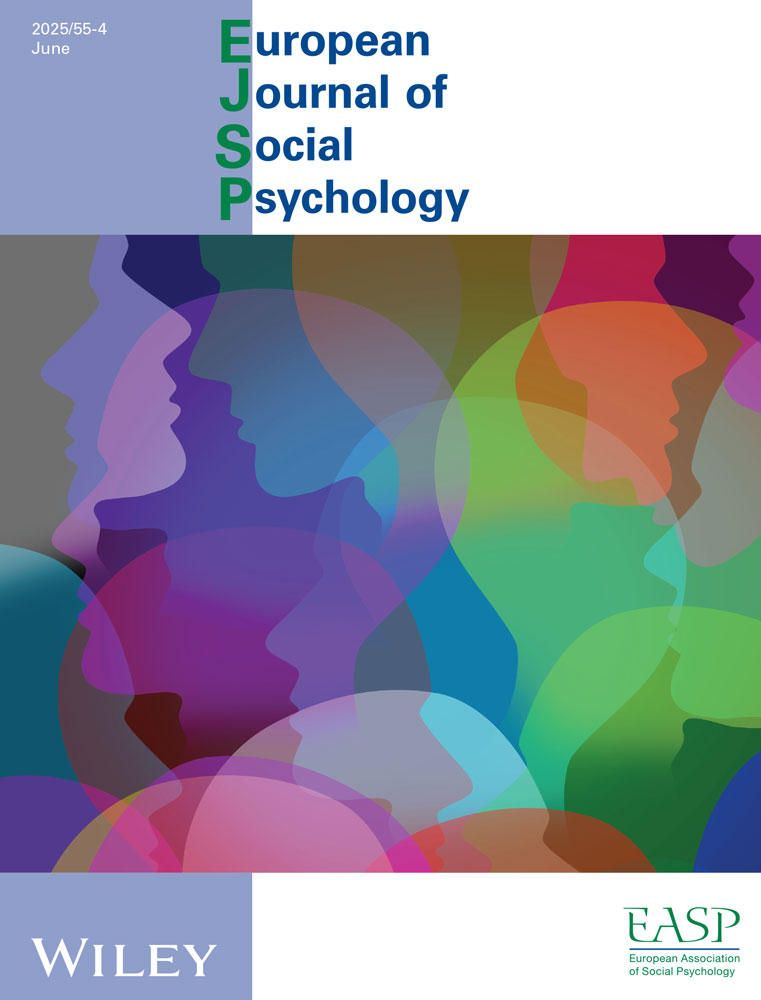Commentary
Social cognition and self-cognition: Two sides of the same evolutionary coin?
Constantine Sedikides,
John J. Skowronski,
Corresponding Author
Constantine Sedikides
University of Southampton, UK
Center for Research on Self and Identity, School of Psychology, University of Southampton, Southampton, SO17 1BJ, UK.Search for more papers by this authorConstantine Sedikides,
John J. Skowronski,
Corresponding Author
Constantine Sedikides
University of Southampton, UK
Center for Research on Self and Identity, School of Psychology, University of Southampton, Southampton, SO17 1BJ, UK.Search for more papers by this author
REFERENCES
- Alicke, M., & Sedikides, C. (2009). Self-enhancement and self-protection: What they are and what they do. European Review of Social Psychology, 20, 1–48.
- R. Byrne, & A. Whiten (Eds.). (1988). Machiavellian intelligence. Oxford: Oxford University Press.
-
Campbell, K. W., &
Sedikides, C.
(1999).
Self-threat magnifies the self-serving bias: A meta-analytic integration.
Review of General Psychology,
3,
23–43.
10.1037/1089-2680.3.1.23 Google Scholar
- Chakrabarti, B., & Baron-Cohen, S. (2008). The biology of mind reading. In N. Ambady, & J. J. Skowronski (Eds.), First impressions (pp. 57–86). New York, NY: Guilford.
- Dapretto, M. (2006). Understanding emotions in others: Mirror neuron dysfunction in children with autism spectrum disorders. Nature Neuroscience, 9, 28–30.
- Fiske, S. T. (1992). Thinking is for doing: Portraits of social cognition from daguerreotype to laserphoto. Journal of Personality and Social Psychology, 63, 877–889.
- Gazzola, V., Aziz-Zadeh, L., & Keysers, C. (2006). Empathy and the somatotopic auditory mirror system in humans. Current Biology, 16, 1824–1829.
- Gaertner, L., Sedikides, C., & Chang, K. (2008). On pancultural self-enhancement: Well-adjusted Taiwanese self-enhance on personally-valued traits. Journal of Cross-Cultural Psychology, 39, 463–477.
- James, W. (1983). The principles of psychology. Cambridge, MA: Harvard University Press. (Original work published in 1890.)
- Kaschak, M. P., & Maner, J. K. (2009). Embodiment, evolution, and social cognition: An integrative framework. European Journal of Social Psychology, 39, 1236–1244. DOI: 10.1002/ejsp.664
- Mikulincer, M., Florian, V., & Hirschberger, G. (2003). The existential function of close relationships—Introducing death into the science of love. Personality and Social Psychology Review, 7, 20–40.
- Niedenthal, P. M., Barsalou, L. W., Winkielman, P., Krauth-Gruber, S., & Francois, R. (2005). Embodiment in attitudes, social pereception, and emotion. Personality and Social Psychology Review, 9, 184–211.
- Pyszczynski, T., Greenberg, J., Solomon, S., Arndt, J., & Schimel, J. (2004). Why do people need self-esteem?: A theoretical and empirical review. Psychological Bulletin, 130, 435–468.
- Riby, D. M., & Hancock, P. J. (2008). Viewing it differently: Social scene perception in Williams syndrome and Autism. Neuropsychologia, 46, 2855–2860.
- Sacks, O. (1995). An anthropologist on Mars. New York: Alfred A. Knopf.
- Schaller, M. (2008). Evolutionary bases of first impressions. In N. Ambady, & J. J. Skowronski (Eds.), First Impressions (pp. 15–34). New York, NY: Guilford.
- Sedikides, C. (1993). Assessment, enhancement, and verification determinants of the self-evaluation process. Journal of Personality and Social Psychology, 65, 317–338.
- Sedikides, C., Gaertner, L., & Toguchi, Y. (2003). Pancultural self-enhancement. Journal of Personality and Social Psychology, 84, 60–70.
- Sedikides, C., Gaertner, L., & Vevea, J. L. (2005). Pancultural self-enhancement reloaded: A meta-analytic reply to Heine (2005). Journal of Personality and Social Psychology, 89, 539–551.
- Sedikides, C., Gaertner, L., & Vevea, J. L. (2007a). Inclusion of theory-relevant moderators yield the same conclusions as Sedikides, Gaertner, and Vevea (2005): A meta-analytic reply to Heine, Kitayama, and Hamamura (2007). Asian Journal of Social Psychology, 10, 59–67.
- Sedikides, C., Gaertner, L., & Vevea, J. L. (2007b). Evaluating the evidence for pancultural self-enhancement. Asian Journal of Social Psychology, 10, 201–203.
- Sedikides, C., & Green, J. D. (2000). On the self-protective nature of inconsistency/negativity management: Using the person memory paradigm to examine self-referent memory. Journal of Personality and Social Psychology, 79, 906–922.
- Sedikides, C., & Green, J. D. (2004). What I don't recall can't hurt me: Information negativity versus information inconsistency as determinants of memorial self-defense. Social Cognition, 22, 4–29.
- Sedikides, C., & Gregg, A. P. (2003). Portraits of the self. In M. A. Hogg, & J. Cooper (Eds.), Sage handbook of social psychology (pp. 110–138). London: Sage Publications.
- Sedikides, C., & Gregg, A. P. (2008). Self-enhancement: Food for thought. Perspectives on Psychological Science, 3, 102–116.
- Sedikides, C., Gregg, A. P., & Hart, C. M. (2007). The importance of being modest. In C. Sedikides, & S. Spencer (Eds.), The self: Frontiers in social psychology (pp. 163–184). New York, NY: Psychology Press.
- Sedikides, C., & Skowronski, J. A. (1997). The symbolic self in evolutionary context. Personality and Social Psychology Review, 1, 80–102.
-
Sedikides, C., &
Skowronski, J. J.
(2000).
On the evolutionary functions of the symbolic self: The emergence of self-evaluation motives. In
A. Tesser,
R. Felson, &
J. Suls (Eds.),
Psychological perspectives on self and identity (pp.
91–117).
Washington, DC: APA Books.
10.1037/10357-004 Google Scholar
- Sedikides, C., & Skowronski, J. J. (2003). Evolution of the self: Issues and prospects. In M. R. Leary, & J. P. Tangney (Eds.), Handbook of self and identity (pp. 594–609). New York, NY: Guilford.
- Sedikides, C., Skowronski, J. J., & Dunbar, R. I. M. (2006). When and why did the human self evolve? In M. Schaller, J. A. Simpson, & D. T. Kenrick (Eds.), Evolution and social psychology: Frontiers in social psychology (pp. 55–80). New York, NY: Psychology Press.
-
Sedikides, C.,
Skowronski, J. J., &
Gaertner, L.
(2004).
Self-enhancement and self-protection motivations: From the laboratory to an evolutionary context.
Journal of Cultural and Evolutionary Psychology,
2,
61–79.
10.1556/JCEP.2.2004.1-2.4 Google Scholar
- Sedikides, C., & Strube, M. J. (1997). Self-evaluation: To thine own self be good, to thine own self be sure, to thine own self be true, and to thine own self be better. Advances in Experimental Social Psychology, 29, 209–269.
- Skowronski, J. J., Betz, A. L., Thompson, C. P., & Shannon, L. (1991). Social memory in everyday life: Recall of self-events and other-events. Journal of Personality and Social Psychology, 60, 831–843.
- Skowronski, J. J., & Sedikides, C. (2007). Temporal knowledge and autobiographical memory: An evolutionary perspective. In R. I. M. Dunbar, & L. Barrett (Eds.), Oxford handbook of evolutionary psychology (pp. 505–517). Oxford, UK: Oxford University Press.
- Walker, W. R., Skowronski, J. J., & Thompson, C. P. (2003). Life is pleasant—and memory helps to keep it that way. Review of General Psychology, 7, 203–210.
- Yamaguchi, S., Greenwald, A. G., Banaji, M. R., Murakami, F., Chen, D., Shiomura, K., et al. (2007). Apparent universality of positive implicit self-esteem. Psychological Science, 18, 498–500.




